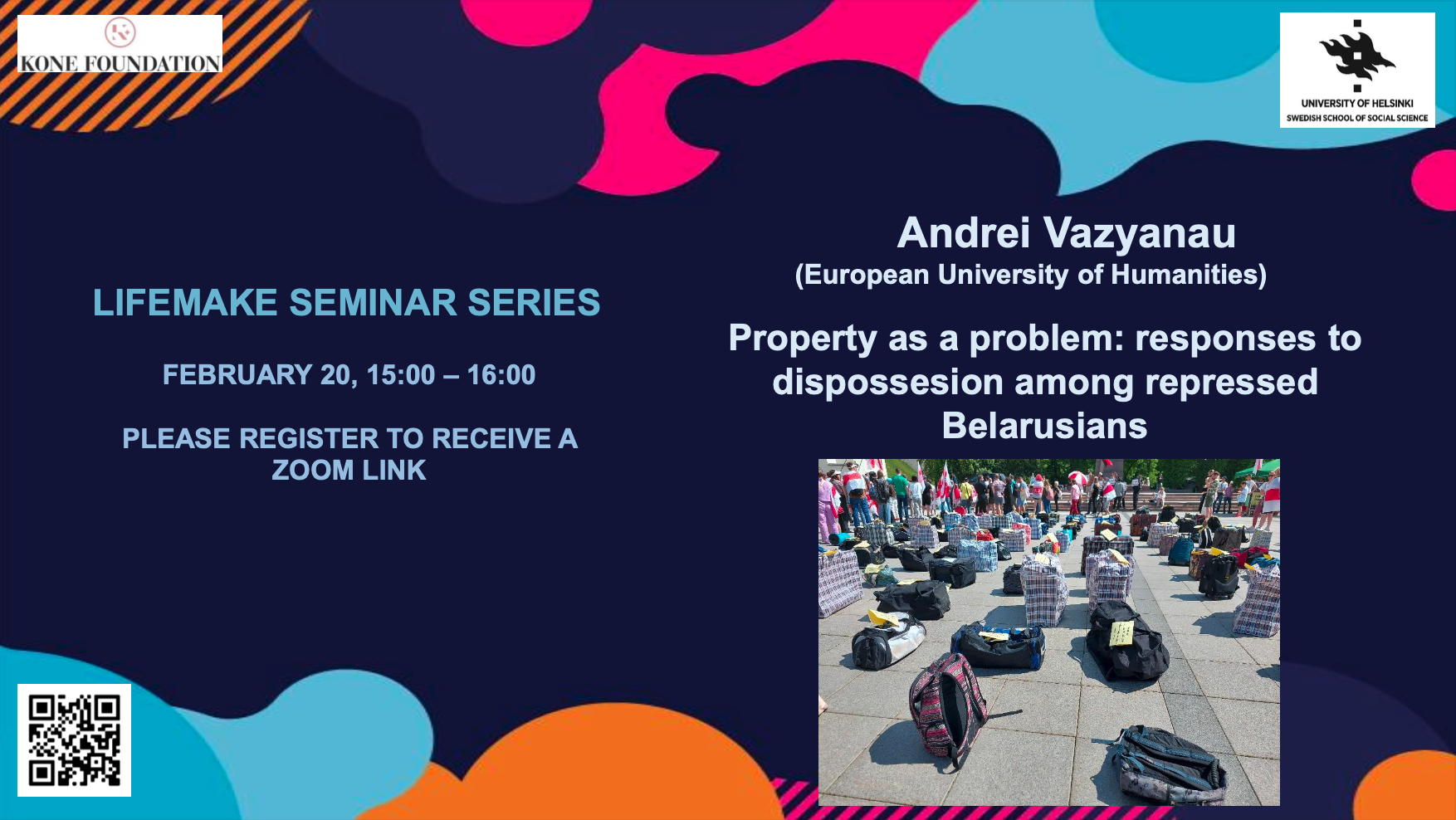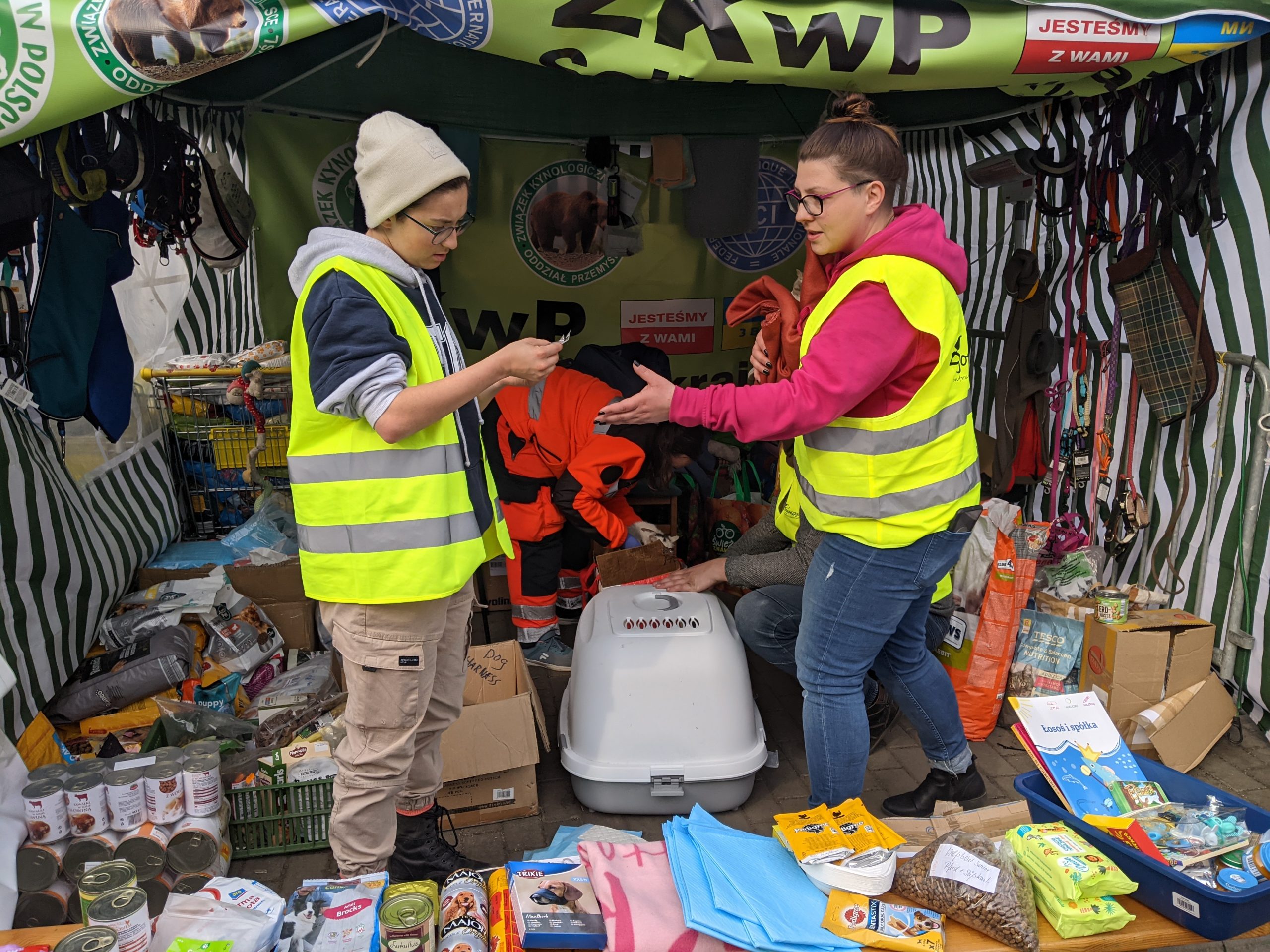February 20, 15:00-16:00 EET (Helsinki time)
Andrei Vazyanau (European University of Humanities): “Property as a problem: responses to dispossession among repressed Belarusians”
see the details

After the rigged presidential election of August 2020 and brutal suppression of the protests that followed, Belarus is facing arguably the most massive repressions in Europe since the breakup of the Soviet Union. Along with dozens thousands of imprisonments and mass exodus from the country – with more than 5% of population leaving within three years – the repressions redefine how Belarusians, both within Belarus and in exile, perceive and manage their possessions. My ethnographic research focuses on the materiality of forced relocations, as a danger and a reality, in the intersecting contexts of domestic mass repressions and increasingly austere EU humanitarian policies – aggravated, in Belarusian case, by legal restrictions imposed on Belarus citizens as a consequence of Russian invasion into Ukraine. Asking Belarusians for lists and descriptions of the objects they retain, wander with, or leave behind, I analyze the implications of their forced mobility that extend beyond the debates on moral right of particular social groups for refuge. Also, my research explores the tactics that relocated people use in order to decrease their dependence on things, especially new things, in their homemaking efforts. Additionally, I am tracing how restrictions on circulation of objects across the borders of Belarus instigates the breakage of connections within (solidary) families and collectives.
Andrei Vazyanau is a lecturer at European Humanities University (Vilnius, Lithuania) and researcher at Minsk Urban Platform (Belarus/Lithuania). He holds his PhD in social anthropology from University of Regensburg (2021, title of the project „Infrastructures in Trouble: Public Transit, Crisis, and Citizens at the Peripheries of Europe“). His fieldwork background includes Donetsk region of Ukraine (Mariupol, Kostyantynivka, Druzhkivka, Horlivka), years 2011-2013; Romania (Galati, Braila, Constanta), years 2015-2016; Belarus (Minsk), 2017-2021. His latest research focused on different aspects of life in post-2020 Belarus such as use of new media, psychotherapeutic practice, dispossessions, and intimate relationships.
March 5, 15:00-16:00 EET (Helsinki time)
Iwona Kaliszewska (University of Warsaw): Crisis as the Potential for Collective Action: Violence and Humanitarianism on the Polish-Ukrainian Border (with Elisabeth Cullen Dunn)
Registration link: https://elomake.helsinki.fi/lomakkeet/128473/lomake.html
see the details

Photo by Iwona Kaliszewska
The notion of crisis once referred to the short, sharp shock of an acute event. Today, it refers more broadly to any event that ruptures stable historical narratives, disrupts once-indisputable teleologies and opens new and undesirable visions of the future. For volunteers in Poland working to support Ukrainian refugees and the Ukrainian military, the Russian invasion of Ukraine posed a crisis because it challenged the supposed inevitability of Poland’s membership in the EU and in the West more generally, threatening to catapult Poland back into a history of war and Russian domination. But for the volunteers, the crisis was also a temporality in which their own actions took on outsize importance, allowing them to attempt to shape history as they worked on seemingly mundane tasks of provisioning and transport. Presentation is based on field research conducted in Ukraine and in the Polish-Ukrainian borderlands between March 2022 and February 2023.
Iwona Kaliszewska is Assistant Professor at the Institute of Ethnology and Cultural Anthropology at the University of Warsaw. Her research focuses on intersections among Islam, state and anti-state violence, and more recently on war and humanitarian crisis. Iwona has been conducting research projects in Dagestan and Chechnya since 2004, and lately in the Polish-Ukrainian borderlands. Her most recent book “For Putin and for Sharia. Dagestani Muslims and the Islamic State” has recently been published by the Cornell University Press.
April 2, 16:00 – 17:00 EEST (Helsinki time)
Zhivka Valiavicharska (Pratt Institute, New York): Social Reproduction and Migration: Recentering the Margins, Expanding the Horizons
Registration via link: https://elomake.helsinki.fi/lomakkeet/128992/lomake.html
see the details
In this talk I discuss questions emerging at the intersection of social reproduction, migration, and diasporic life, which to some extent move away from the literature on gender and immigration that sees migrants exclusively as a labor force. My discussion, emerging from the context of the challenges and struggles of migrant people in the United States, is driven by a set of questions beyond structural analyses of labor, welfare, and the law: What does the work of reproduction mean for precariously present people living in a state of prolonged or permanent suspension and under the impending possibility of expulsion? What are the meanings of “family,” “home,” and the labor that sustains community bonds when it is work that contends with the traumatic effects of uprooting, disruption, and loss? What does it take to sustain relationships within family, community, and lovers in legal conditions designed to restrict, sever, and punish even the most basic social and intimate bonds? How do we think of this work politically when it pushes against forces of cultural assimilation and historical erasure, of everyday hostility and xenophobia? By centering on the experiences of migrant people, the talk aims to broaden existing narratives of social reproduction. It highlights the tremendous political importance of reproductive, emotional, and care practices that persist on the margins of the system and explores their potentials for expanding our feminist histories, struggles, and social horizons.
Zhivka Valiavicharska is a political theorist and art historian working on the social, cultural, and art histories of twentieth-century Bulgaria and Eastern Europe in their global and diasporic dimensions. She is Associate Professor at Pratt Institute, New York, and the author of Restless History: Political Imaginaries and their Discontents in Post-Stalinist Bulgaria (McGill University Press, 2021).
May 14, 15:00 – 16:00 EEST (Helsinki time)
Hannah Schling (University College London): Depleted social reproduction: frictions in a just-in-time dormitory labour regime.
Hannah Schling (University College London)
Registration via link: https://elomake.helsinki.fi/lomakkeet/129289/lomake.html
see the details
Outsourced worker dormitories underpin the Czech Republic’s export-oriented and globally integrated manufacturing and warehousing sectors. Arranged by intermediaries and housing workers arriving from Slovakia, Bulgaria, Romania, Ukraine, and Mongolia, dormitories organise workers’ social reproduction towards mediating the ‘flexible’ temporalities of labour demanded by just-in-time production regimes. Drawing on ethnographic research within dormitories in two Czech cities, my talk examines ways in which these arrangements are also beset by logistical ‘frictions’ between depleted social reproduction, globally-integrated production, and workers’ contested im/mobilities. In other words, dormitories underpin the just-in-time dynamics of production, but also structure a raft of contradictions within the labour regime. My talk seeks to highlight contemporary dynamics within migrant workers experiences in Czechia, as well as open questions about the constitutive and crisis-riddled relationality of social reproduction and value production within logistical regimes, as well as the dimensions of mobility and emplacement within mobile workers’ means of contestation, agency and resistance.
Hannah Schling is Lecturer in Economic Geography at University College London. Drawing on feminist political economy and labour geography, her research examines questions of social reproduction, temporalities, bordering and labour migration Central and Eastern Europe. Since completing her PhD in Human Geography at King’s College London she has held positions in the Geography Departments of the University of Glasgow and Queen Mary University of London.